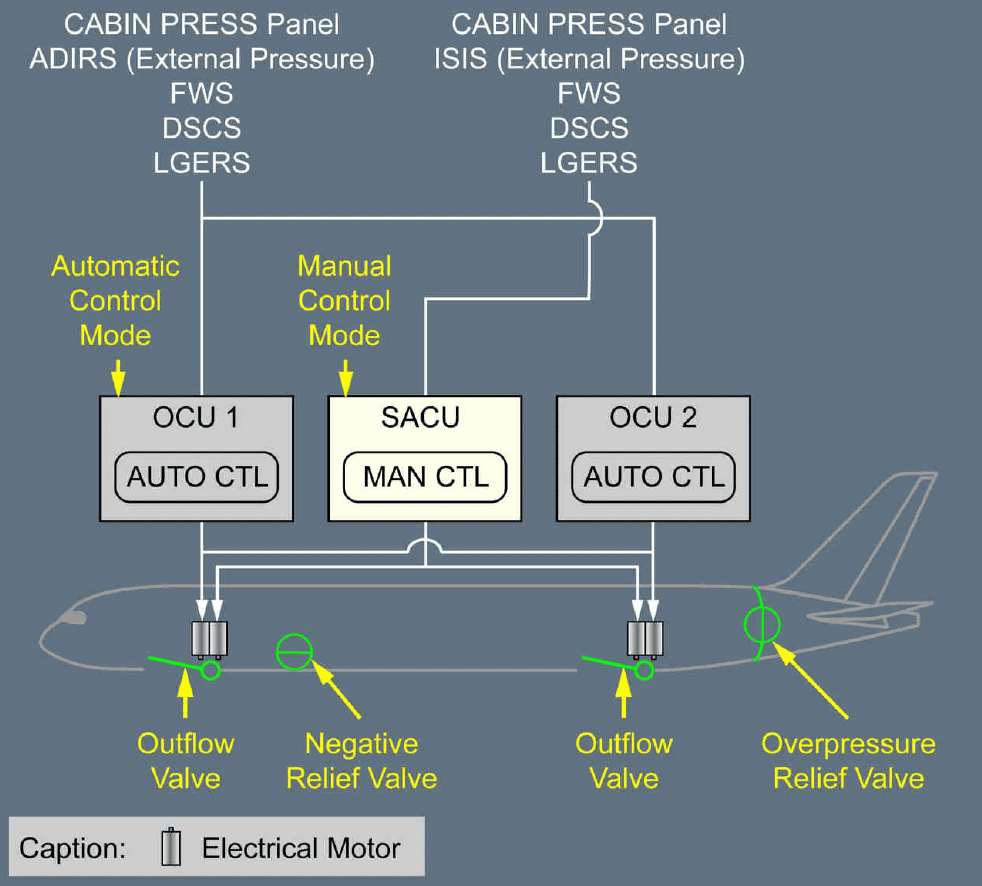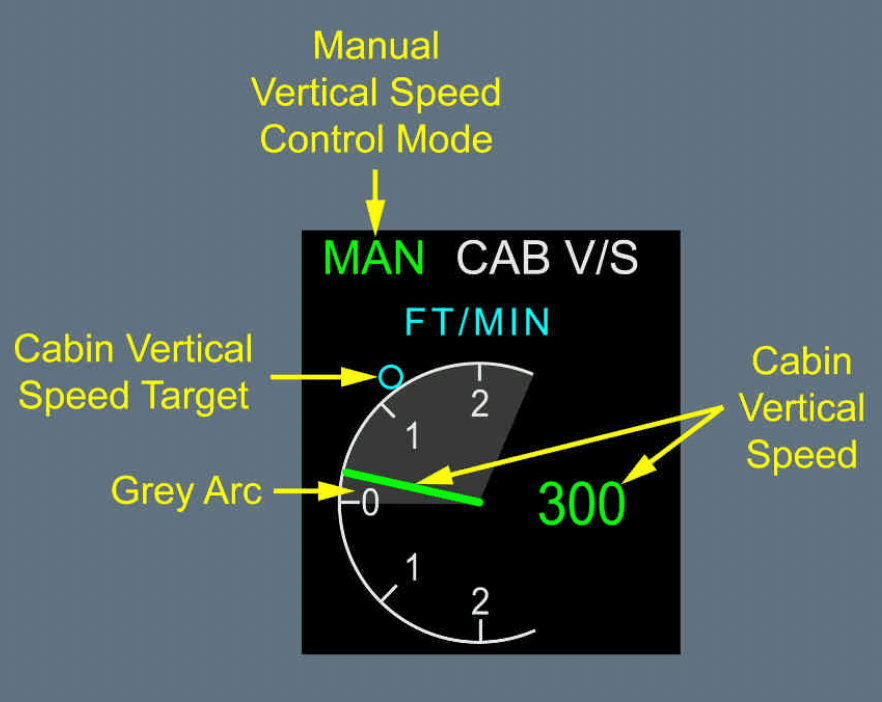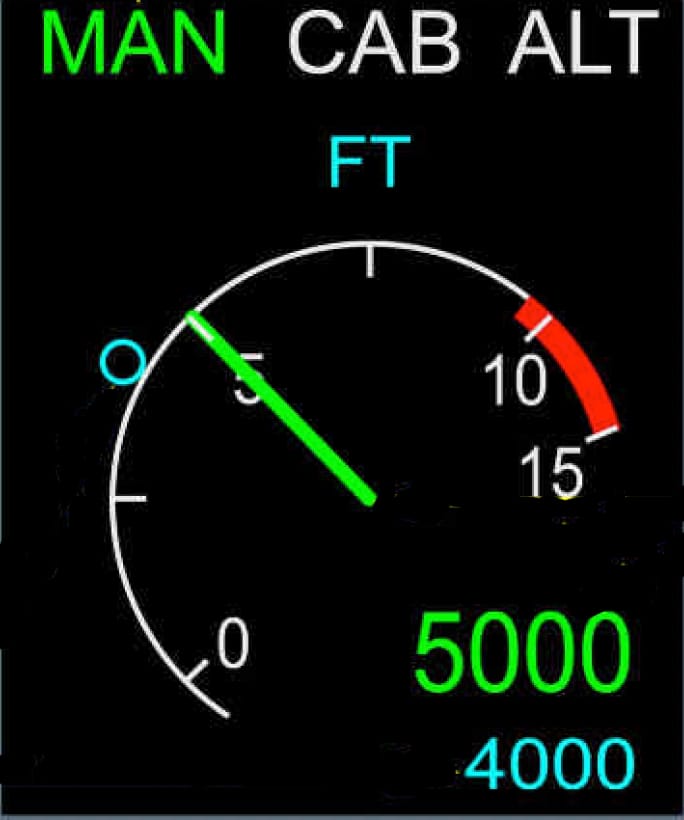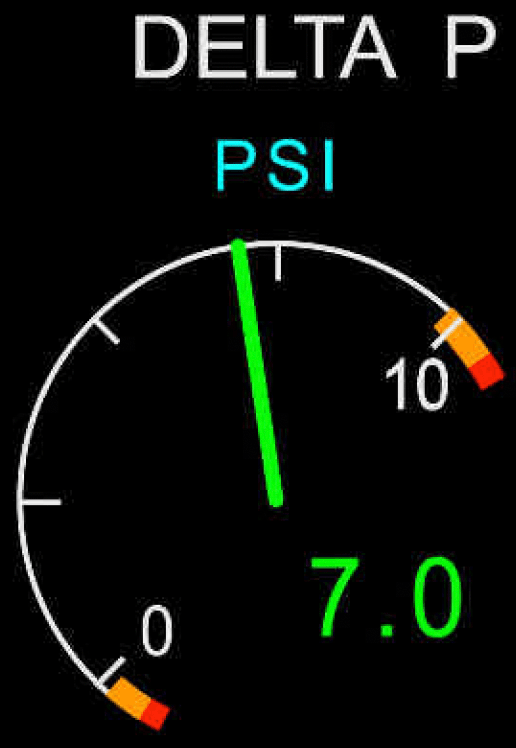______ all outflow valves open, to ensure there is no differential pressure between the air inside the aircraft and the external air.
During cruise the cabin altitude is regulated to remain:
When the Cabin altitude is manually controlled, the cabin altitude must be manually selected via the _____. The cabin altitude target remains at the current value until the flight crew manually selects a new cabin altitude target.
The manual pressurization system operates independently of the automatic pressurization system. To obtain the desired cabin altitude and vertical speed, the manual pressurization system uses external pressure from:
Which statement is true?

In automatic mode (when the CABIN ALT MODE pb-sw and CABIN VS MODE pb-sw are set to AUTO), one Outflow valve Control Unit (OCU) automatically controls the cabin altitude target, and the cabin vertical speed. If the differential pressure exceeds the maximum limit of the electronic differential pressure protection, the master OCU is shut off and the remaining OCU takes over control to recover, and opens the two outflow valves.
In automatic and manual mode the pressurization system prevents the positive and negative differential pressure from going too high. It also prevents the cabin altitude from going too high. The two outflow valves close when the cabin altitude exceeds _____ in automatic mode and _____ in manual mode.
In the event the pressurization system fails, one independent overpressure relief valve automatically prevents positive and negative cabin pressure from going too high. This valve is located:
The cabin vertical speed is displayed, when the A/C is in flight. The cabin vertical speed arrow and digital indication pulse in green if:
In automatic mode (when the CABIN ALT MODE pb-sw and CABIN VS MODE pb-sw are set to AUTO), one Outflow valve Control Unit (OCU) automatically controls the cabin altitude target, and the cabin vertical speed. There are two OCUs. OCU1 computes the cabin pressure targets and provides corresponding commands to OCU2. Both OCUs drive their corresponding outflow valve, more open or closed, in order to reach the demanded pressure target. If one OCU fails the other one takes over the control of the two outflow valves.
During cruise, the cabin altitude is regulated not to exceed:
Advertisement
The aircraft is pressurized at a rate of ______ : this ensures a differential pressure of 0.1 PSI at liftoff.
If the differential pressure exceeds the maximum limit of the electronic differential pressure protection, the master OCU (Outflow valve Control Unit) is shut off and the remaining OCU takes over control to recover, and opens the two outflow valves. This limit is equal to:
During climb, the cabin vertical speed is determined to reach the scheduled cabin altitude at the top of climb defined by the FMS cruise level. The cabin vertical speed is limited to ______.
In order to automatically control the cabin pressure, each OCU (Outflow valve Control Unit) uses the FMS flight plan (including the landing elevation), together with current outside air pressure, and air conditioning system status (the landing elevation is necessary to be in automatic mode). The OCUs use an internal pressure sensor to determine the cabin differential pressure, and the cabin altitude. The cabin vertical speed is determined via a predetermined scale.
The cabin altitude needle and digital indication pulse in green (except for high altitude airport operations (Landing elevation is more than 8 000 ft), if the cabin altitude is above 8 300 ft, and below 9 550 ft. They stop pulsing, if the cabin altitude goes below 8 100 ft.
The aircraft is equipped with one negative relief valve, that operates mechanically with differential pressure. The negative relief valve prevents the negative differential pressure from going too high. The negative relief valve is installed on the right side of the forward part of the aircraft, above the flotation line. The negative relief valve mechanically-opens, in order to not exceed the maximum negative differential pressure, which is equal to:
In MANUAL MODE, The cabin vertical speed target has priority over the cabin altitude target.

A gray arc from 0 fpm to 2 500 fpm appears when the cabin altitude and the cabin vertical speed are both manually controlled, when the cabin vertical speed target is more than the current cabin vertical speed. The gray arc indicates the flight crew the acceptable range to set the cabin vertical speed target. The cabin altitude target has priority over the cabin vertical speed target.
When the CABIN ALT MODE pb-sw is set to MAN, the flight crew uses the selector to manually select the cabin altitude target. Selected cabin altitude target is displayed on the CAB PRESS SD page only.
There are two outflow valves:
When the RAM AIR pb is set to ON, both packs are off, and the differential pressure is less than _____, the system automatically opens the outflow valves to approximately 50 %, to ensure the ventilation of the cockpit and cabin.
Advertisement
What is the meaning of this indication?

If the cabin altitude exceeds _____, the ECAM will trigger the red CAB PRESS EXCESS CAB ALT warning on the WD.
The pressurization system is in auto mode. If the LDG ELEVN (landing elevation) indicates 7000 ft, this means:

During takeoff, the Cabin Pressure Control System (CPCS) pressurizes the aircraft to provide a smooth variation of the cabin vertical speed at liftoff.
The pressurization descent phase occurs:
During automatic operation and before takeoff, all outflow valves close, to ensure there is no differential pressure between the air inside the aircraft and the external air.
Before takeoff all outflow valve open.
The pressurization abort phase occurs, when:
What is the true statement?

During descent, the cabin vertical speed is controlled, to ensure that the cabin altitude reaches ______ the landing elevation prior to landing.
The pressurization takeoff phase occurs, when:
Advertisement
